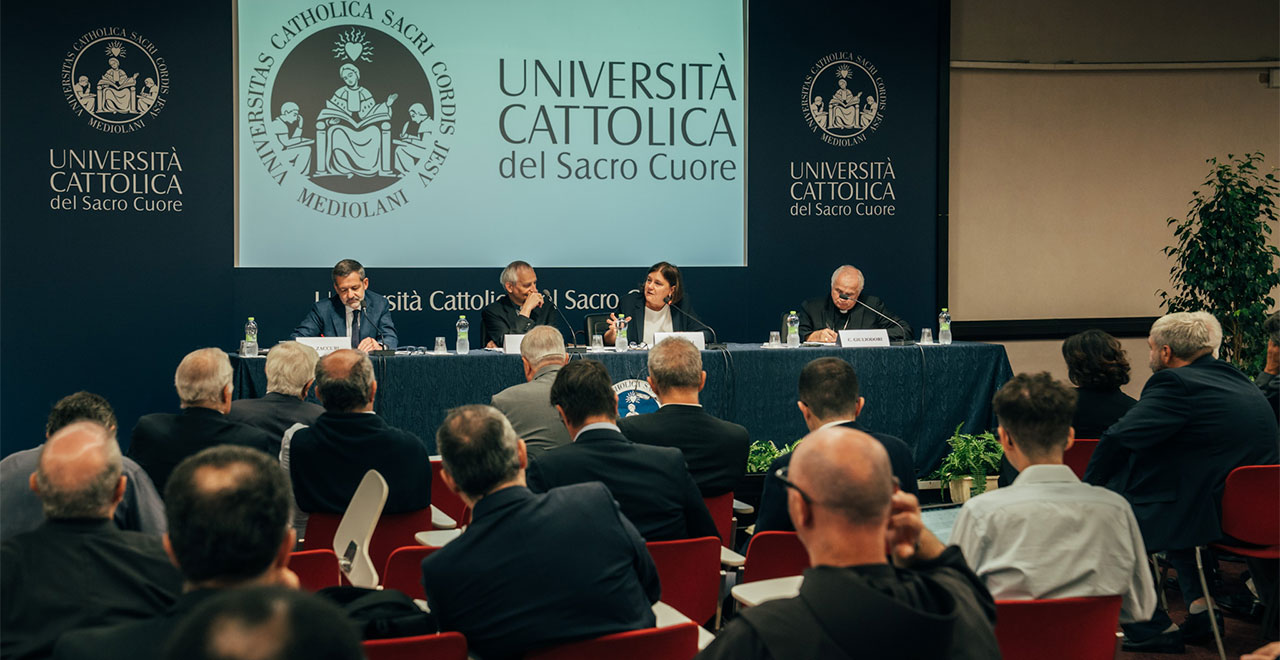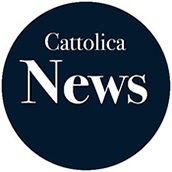“The university is not only a place where content is learned, but also where young people are helped to understand the dimension of ‘we’” - thus, in one of the most significant passages of his speech, Cardinal Matteo Zuppi, Archbishop of Bologna and President of the Italian Bishops’ Conference, in the dialogue with Professor Elena Beccalli, Rector of Università Cattolica, moderated by Alessandro Zaccuri, Director of Communications of the University, which was held on September at the See of Rome, at the conclusion of the four-day seminar that brings together theology professors and pastoral assistants each year entitled “Generators of Hope. Walking with young people in the light of the Jubilee”.
The dialogue between Card. Matteo Zuppi and Rector Elena Beccalli (IT)
“Università Cattolica and we researchers have a great responsibility: we must see ourselves as true ‘hope-makers’, through studies and changes that can impart a change of vision from the present time,” said Rector Beccalli. This is possible by listening to and understanding young people and focusing on an educational perspective. Coming alongside young people by taking care of them, educating them in the desire to participate in social life, as well as in building projects, is a seed planted to bring forth hope.”
The seminar: theological reflections, cultural insights, plans for the future
A stage in the common university journey, a creative itinerary rediscovering being a community, the importance of relationships and education not as the transmission of instructions, but as the care and formation of people who in the near future will make choices and assume responsibilities, in the constant inspiration of “Spes non confundit”, the Bull of Indiction of the Ordinary Jubilee of the Year 2025: all this was the Seminar that this year had Hope as the compass of paths, budgets, ideas and horizons, in two locations, the Ospedale Isola Tiberina - Gemelli Isola and the Rome campus of Università Cattolica, where the “medical humanities” are embodied in, not only physical, but also spiritual and human care.
The Seminar began, on September 9, in the Aula Magna of the Ospedale Isola Tiberina - Gemelli Isola with institutional greetings from Rector Elena Beccalli and Dr. Paolo Nusiner, Director General of the Athenaeum and President of the Hospital.
The opening meeting at Ospedale Isola Tiberina - Gemelli Isola (IT)
In keeping with the mission of Università Cattolica, professors of theology and pastoral assistants reflected throughout the days, from social, cultural and theological perspectives, on the importance of being able to discern the signs of the times in order to make them become signs of hope, following the exhortation contained in the Papal Bull (No. 7).
And they did so, in addition to the plenary and public sessions at the opening and closing of the Seminar, through joint meetings of cultural and scientific insights with the University’s professors Silvano Petrosino, Daniele Bruzzone, Gabriele Sani and Maria Luisa Di Pietro, alongside didactic and planning meetings and working group meetings. Always keeping in mind the context of the Cammino Sinodale which on the day of September 11 marked an important stage in sharing during the plenary meeting with the intervention of Professor Giuseppina Di Simone, professor of Theology at the Pontifical Theological Faculty of Southern Italy and member of the Assembly of the Synod of Bishops and of the Presidency of the Cammino Sinodale in Italy: “Concreteness and foresight: these are the paths that the Synodal Way has traced so far, through which we want to be exactly, as with the Jubilee, “generators of hope.” This is precisely the ultimate goal of the journey: what is expected from the Church is a word of hope that has the character of experience, in concrete life, of witness. But at the same time looking far and dreaming together: what allows us to rethink reality and regenerate thinking. In a time when there is no shortage of desire for God: it is only necessary, with a new look, to learn to discern it.”
“University Guidelines about Equal Opportunities, Inclusive Languages and Gender Issues" is the title of the talk given by Professor Raffaella Iafrate, Professor of Psychology and the Rector’s Delegate for Equal Opportunities of the University, on the Rome campus on the same Wednesday 11, outlining all the University’s existing initiatives and future projects, as part of the Task Force on Equal Opportunity: “Overcoming gender discrimination and valuing female figures within our University has been and is our purpose,” said the professor, “but not as a mere assertion of rights or claim of differences, but rather as a recognition of the dignity of each person in his or her differentiated uniqueness, toward the protection of frailties and the full enhancement of people in their relational dimension. This is also done through some Guidelines: on inclusive language, on parenting support for male and female students, on alias careers.”
And again, on September 12, the three Panels of Hope Laboratories in Università Cattolica del Sacro Cuore with the participation of Professor Antonio Gasbarrini, Dean of the Faculty of Medicine and Surgery of the Athenaeum and Professor Antonella Occhino, Dean of the Faculty of Economics of the Athenaeum, dedicated to Medical Sciences, New Technologies, Solidarity and Ethical Challenges; Democratic culture and sustainable citizenship; Poverty, debt, finance and the new economy.
At the conclusion of each day, Eucharistic concelebrations presided over by S. Em. Card. Marcello Semeraro, Prefect of the Dicastery for the Causes of Saints, by S. E. Msgr. Rino Fisichella, Pro-Prefect of the Section for Fundamental Questions of Evangelization in the World, and by S. Em. Card. Mario Grech, Secretary General of the Secretariat of the Synod of Bishops.
At the end of the four days S. E. Msgr. Claudio Giuliodori, General Ecclesiastical Assistant of the Università Cattolica and President of the Bishops Commission for Catholic Education, Schools and Universities, delivered the conclusions of the seminar: “During these four days,” the bishop said, “we shared a very intense program, addressing issues that contribute to the growth of each of us and the entire university community. We have developed an intense inter- and transdisciplinary dialogue addressing knowledge that, with the help of theology and ethics, becomes living wisdom and a guarantee of growth for each person and for society as a whole. Hope is a living memory of the future, and the future is not uncertainty, but expectation of a fulfilment already in being and at the same time in becoming: in this perspective, as the Athenaeum of Italian Catholics, we are called to participate in the jubilee event in order to go even deeper into the dynamisms of both the ecclesial community and social reality. The world faces continuous and difficult challenges, but it continues to be generative precisely because of the hope that for us is certain and firmly rooted in Christ, as St. Paul states in his letter to the Romans (cf. 8:22-25).”




